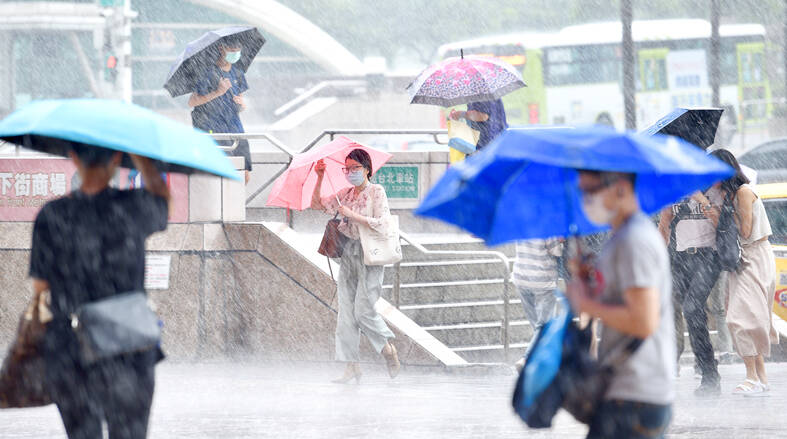The nation’s average temperatures have risen 1.5°C over the past century, a joint research project led by the Central Weather Administration (CWA) showed.
In the report to the legislature’s Transportation Committee yesterday, the CWA said extreme temperatures would become more common, with fewer spring showers.
Plum rains are expected to become more intense, it said, adding that there would be fewer typhoons affecting Taiwan, but those that do would be stronger and bring more rain.

Photo: Peter Lo, Taipei Times
The agency said it is still developing its next-generation severe weather monitoring system to improve predictions.
The Water Resources Agency (WRA) is also developing a drought warning system that has monitoring stations across the country with a resolution of 1km, it said, adding it would be able to provide drought forecasts one to three months in advance.
There would be new shoreline wind forecasts this typhoon season to assist local governments in deciding when to cancel work and school, the CWA said.
Severe rain forecasts are updated every three hours, and a warning system is also in place to send notifications when flash flooding is likely in mountainous regions, it said.
In related news, the WRA said that a weather front brought 19.08 million cubic meters of precipitation to reservoirs across the nation over the past three days, mainly in northern Taiwan.
From 7am on Friday to 7am yesterday, Sinshan (新山水庫), Shihmen (石門水庫), Feitsui (翡翠水庫) and Baoshan Second (寶二水庫) reservoirs, and Yuanshan Weir (鳶山堰) in the north collected 9.9 million cubic meters of rainwater, with Feitsui Reservoir receiving the most at 3.9 million cubic meters, WRA data showed.
Sinshan was at 92.7 percent capacity yesterday morning, Feitsui was at 75.4 percent, Shihmen was at 28.3 percent and Baoshan Second was at 36.9 percent.
In central Taiwan, Yongheshan (永和山水庫), Mingde (明德水庫), Liyutan (鯉魚潭水庫), Deji (德基水庫), Hushan (湖山水庫), Sun Moon Lake (日月潭水庫) and Wushe (霧社水庫) reservoirs received 8.6 million cubic meters of rainwater, with Deji Reservoir collecting the most at 2.8 million cubic meters.
As of yesterday morning, the Liyutan, Deji and Sun Moon Lake reservoirs were at 33.6 percent, 55 percent and 73.5 percent capacity respectively.
In the south, the Zengwen (曾文水庫), Wushantou (烏山頭水庫) and Nanhua (南化水庫) reservoirs received a total of 500,000 cubic meters of rainwater, and were at 79.1 percent, 43.3 percent and 37.5 percent capacity respectively.

People can preregister to receive their NT$10,000 (US$325) cash distributed from the central government on Nov. 5 after President William Lai (賴清德) yesterday signed the Special Budget for Strengthening Economic, Social and National Security Resilience, the Executive Yuan told a news conference last night. The special budget, passed by the Legislative Yuan on Friday last week with a cash handout budget of NT$236 billion, was officially submitted to the Executive Yuan and the Presidential Office yesterday afternoon. People can register through the official Web site at https://10000.gov.tw to have the funds deposited into their bank accounts, withdraw the funds at automated teller

PEACE AND STABILITY: Maintaining the cross-strait ‘status quo’ has long been the government’s position, the Ministry of Foreign Affairs said Taiwan is committed to maintaining the cross-strait “status quo” and seeks no escalation of tensions, the Ministry of Foreign Affairs (MOFA) said yesterday, rebutting a Time magazine opinion piece that described President William Lai (賴清德) as a “reckless leader.” The article, titled “The US Must Beware of Taiwan’s Reckless Leader,” was written by Lyle Goldstein, director of the Asia Program at the Washington-based Defense Priorities think tank. Goldstein wrote that Taiwan is “the world’s most dangerous flashpoint” amid ongoing conflicts in the Middle East and Russia’s invasion of Ukraine. He said that the situation in the Taiwan Strait has become less stable

CONCESSION: A Shin Kong official said that the firm was ‘willing to contribute’ to the nation, as the move would enable Nvidia Crop to build its headquarters in Taiwan Shin Kong Life Insurance Co (新光人壽) yesterday said it would relinquish land-use rights, or known as surface rights, for two plots in Taipei’s Beitou District (北投), paving the way for Nvidia Corp to expand its office footprint in Taiwan. The insurer said it made the decision “in the interest of the nation’s greater good” and would not seek compensation from taxpayers for potential future losses, calling the move a gesture to resolve a months-long impasse among the insurer, the Taipei City Government and the US chip giant. “The decision was made on the condition that the Taipei City Government reimburses the related

FRESH LOOK: A committee would gather expert and public input on the themes and visual motifs that would appear on the notes, the central bank governor said The central bank has launched a comprehensive redesign of New Taiwan dollar banknotes to enhance anti-counterfeiting measures, improve accessibility and align the bills with global sustainability standards, Governor Yang Chin-long (楊金龍) told a meeting of the legislature’s Finance Committee yesterday. The overhaul would affect all five denominations — NT$100, NT$200, NT$500, NT$1,000 and NT$2,000 notes — but not coins, Yang said. It would be the first major update to the banknotes in 24 years, as the current series, introduced in 2001, has remained in circulation amid rapid advances in printing technology and security standards. “Updating the notes is essential to safeguard the integrity